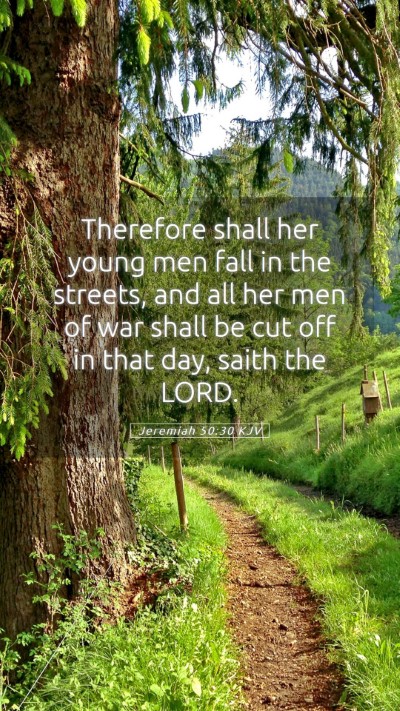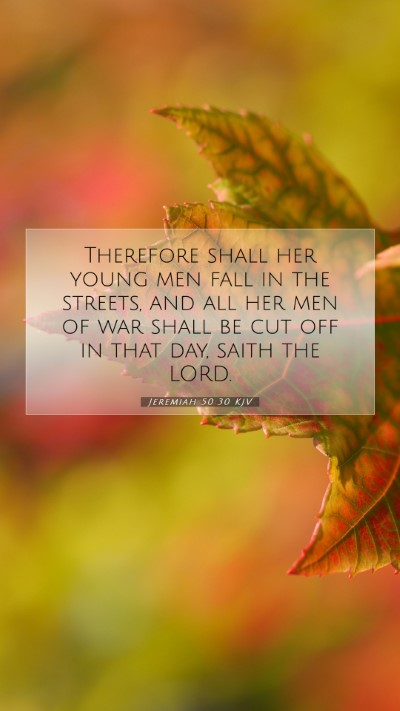Understanding Jeremiah 50:30
Verse: Jeremiah 50:30 (KJV) - "Therefore shall her young men fall in the streets, and all her men of war shall be cut off in that day, saith the Lord."
Bible Verse Meaning
The verse speaks to the prophesied downfall of Babylon, emphasizing the inevitable destruction that awaits its warriors and young men. This prophetic message highlights God's judgment against a nation known for its oppression and idolatry. Various public domain commentaries provide insight into the weighty implications of this scripture.
Bible Verse Interpretations
Matthew Henry explains that this passage addresses the destruction awaiting Babylon as a consequence of its pride and cruelty. He underscores that Babylon's military and young men represent the physical strength and moral failing of the nation, which, due to its wickedness, cannot prevail against divine judgment.
Albert Barnes emphasizes that the prophecy is directed towards the comprehensive demise of Babylon, linking it to the broader theme of God's sovereignty over nations. He notes that the "young men" symbolize vitality and strength, which are rendered powerless against God's decree.
According to Adam Clarke, the focus on the "young men in the streets" suggests a scene of chaos and sorrow resulting from warfare, illustrating the harsh reality of judgment and its impact on society's backbone—its youth and defenders.
Bible Verse Commentary
This passage can be seen as a fulfillment of ancient prophecies concerning Babylon—as noted in various other scriptures, including Isaiah 13:15-22 and Revelation 18:2, which also depict the fall of great empires as a direct result of divine intervention and justice. The fallen nature of Babylon is further echoed in these texts that demonstrate the biblical theme of God’s power over earthly kingdoms, enforcing His will among mankind.
Scripture Analysis
- Thematic Elements: The theme of divine judgement is prominent within Jeremiah, reflecting the consequences of transgressions against God's commandments.
- Historical Context: This verse is situated in a time of prophecy that anticipates the Babylonian exile's end, serving as a warning and comfort to the Israelites.
- Application: Understanding this scripture provides insight into the importance of aligning with God's righteousness to avoid judgment, applicable to both ancient and modern contexts.
In-Depth Analysis
In-depth studies of Scripture often reveal complexities that demand attention to historical and cultural contexts. When interpreting Jeremiah 50:30, one can explore:
- Jeremiah's prophetic role: Understanding the contextual backdrop of Jeremiah's writings enhances our appreciation of the significance of his messages.
- The nature of prophecy: Distinguishing between immediate and eschatological fulfillments is crucial in grasping the continuing relevance of such verses.
- Symbolism: The imagery of warfare and downfall serves not only as a historical account but also parallels spiritual battles faced by believers today.
Application to Daily Life
For believers seeking meaning in such verses, this passage illustrates the importance of upholding justice and integrity in personal and communal life. It serves as a reminder that pride and wickedness have essential consequences, reinforcing the need for repentance and reliance on God’s guidance.
Cross References
- Isaiah 13:15-22 - Prophecy regarding the fall of Babylon
- Revelation 18:2 - The pronouncement of Babylon's fall and desolation
- Jeremiah 51:30 - Further description of Babylon’s military fate
Conclusion
Jeremiah 50:30 serves as a potent reminder of God's sovereignty and the certainty of His judgment. Moreover, it captures the profound consequences of moral failure and the transient nature of human power. For those engaging in Bible study, this verse and its interpretations provide fertile ground for deeper understanding of both historical and contemporary faith struggles.


